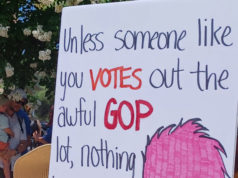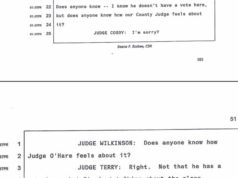This week’s cover story examines the embattled newspaper industry and ponders whether two things — paywalls and iPads — might save the day. Most readers, up to now, haven’t been willing to pay for online news, when so much of it is available for free. But a handful of major papers including The Dallas Morning News have installed paywalls, and once other newspapers and magazines follow suit, there won’t be so much free news available, particularly local news.
 An interesting example: The FBI investigation of Dallas County Commissioner John Wiley Price is sparking huge interest in the Metroplex. Price has been a lightning rod for controversy for two decades. TV news stations and the Associated Press are covering the story but not nearly as intensely as the Morning News, which quickly established ownership by assigning numerous reporters and columnists to it. But the paywall is keeping those stories under wraps for all but those willing to pay. Newspapers were popular and profitable in the past because they created a product that informed, titillated, infuriated, and humored readers on a daily basis. Newspapers created a buzz in their communities. Advertisers were willing to pay to be a part of that product. Once the free news is gone, people will be more likely to buy online subscriptions. At least, that’s what publishers are praying for.
An interesting example: The FBI investigation of Dallas County Commissioner John Wiley Price is sparking huge interest in the Metroplex. Price has been a lightning rod for controversy for two decades. TV news stations and the Associated Press are covering the story but not nearly as intensely as the Morning News, which quickly established ownership by assigning numerous reporters and columnists to it. But the paywall is keeping those stories under wraps for all but those willing to pay. Newspapers were popular and profitable in the past because they created a product that informed, titillated, infuriated, and humored readers on a daily basis. Newspapers created a buzz in their communities. Advertisers were willing to pay to be a part of that product. Once the free news is gone, people will be more likely to buy online subscriptions. At least, that’s what publishers are praying for.
Your Land Is Their Land
It didn’t surprise anyone when Gov. Rick Perry signed two bills that have grassroots groups on all sides of the political spectrum in an uproar (“Fire Sale,” June 15, 2011). Senate Bills 1048 and 1420 essentially allow state and local government agencies to turn over control of the public’s assets — from roads to water systems to hospitals to government buildings — to private companies on long-term leases, and allow them to then charge fees to the public for their use. In such contracts, the terms are usually so lopsided that one expert told the Weekly they could, in effect, make the corporations another arm of government. And this despite the painful evidence delivered to Perry a few years ago about the public’s opposition to such deals, when his baby, the Trans-Texas Corridor, went down.
There could still be surprises in wait on this issue, however — for Perry. Tea Party groups all over the state went on record against one or both of the measures, and there are dyed-in-the-wool conservatives who say they’ll go after supporters of the two measures at the ballot box.











